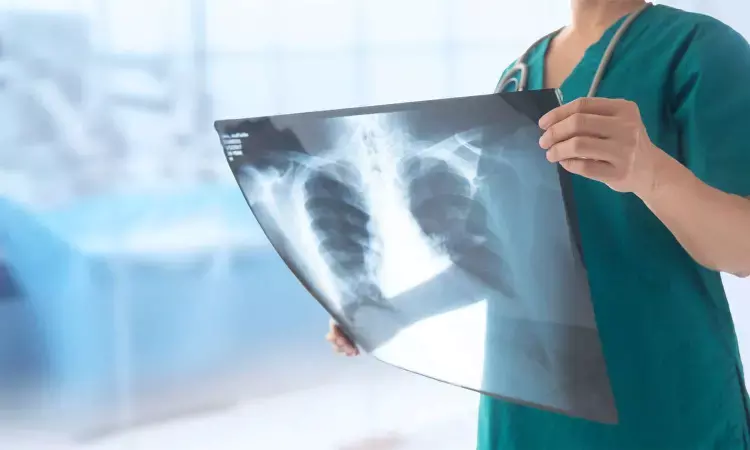- Home
- Medical news & Guidelines
- Anesthesiology
- Cardiology and CTVS
- Critical Care
- Dentistry
- Dermatology
- Diabetes and Endocrinology
- ENT
- Gastroenterology
- Medicine
- Nephrology
- Neurology
- Obstretics-Gynaecology
- Oncology
- Ophthalmology
- Orthopaedics
- Pediatrics-Neonatology
- Psychiatry
- Pulmonology
- Radiology
- Surgery
- Urology
- Laboratory Medicine
- Diet
- Nursing
- Paramedical
- Physiotherapy
- Health news
- Fact Check
- Bone Health Fact Check
- Brain Health Fact Check
- Cancer Related Fact Check
- Child Care Fact Check
- Dental and oral health fact check
- Diabetes and metabolic health fact check
- Diet and Nutrition Fact Check
- Eye and ENT Care Fact Check
- Fitness fact check
- Gut health fact check
- Heart health fact check
- Kidney health fact check
- Medical education fact check
- Men's health fact check
- Respiratory fact check
- Skin and hair care fact check
- Vaccine and Immunization fact check
- Women's health fact check
- AYUSH
- State News
- Andaman and Nicobar Islands
- Andhra Pradesh
- Arunachal Pradesh
- Assam
- Bihar
- Chandigarh
- Chattisgarh
- Dadra and Nagar Haveli
- Daman and Diu
- Delhi
- Goa
- Gujarat
- Haryana
- Himachal Pradesh
- Jammu & Kashmir
- Jharkhand
- Karnataka
- Kerala
- Ladakh
- Lakshadweep
- Madhya Pradesh
- Maharashtra
- Manipur
- Meghalaya
- Mizoram
- Nagaland
- Odisha
- Puducherry
- Punjab
- Rajasthan
- Sikkim
- Tamil Nadu
- Telangana
- Tripura
- Uttar Pradesh
- Uttrakhand
- West Bengal
- Medical Education
- Industry
Lung Ultrasound may help Monitor Pulmonary Changes In ECMO-Treated Cardiogenic Shock Patients

A recent study published in BMC Anesthesiology reveals that Lung ultrasound (LUS) holds promise as a valuable tool for assessing pulmonary changes in patients experiencing cardiogenic shock and undergoing venoarterial extracorporeal membrane oxygenation (VA-ECMO) therapy. Cardiogenic shock is a life-threatening condition characterized by the heart's inability to pump enough blood to meet the body's demands. In severe cases, patients may require venoarterial extracorporeal membrane oxygenation (VA-ECMO), a therapy that provides temporary mechanical circulatory support. While VA-ECMO can be a life-saving intervention, it is crucial to monitor patients closely for any complications, particularly related to the lungs.
The study was conducted by Rongguo Wang and team at Xuzhou Central Hospital aimed to evaluate the value of lung ultrasound (LUS) in assessing pulmonary changes in cardiogenic shock patients on VA-ECMO.The retrospective study, which spanned from September 2015 to April 2022, included patients with cardiogenic shock who received VA-ECMO treatment. The researchers assessed the LUS scores at different time points during ECMO to determine its efficacy as a diagnostic tool.
The findings of the study were:
● The study involved a total of 22 patients, divided into a survival group (n=16) and a non survival group (n=6).
● The intensive care unit (ICU) mortality rate was found to be 27.3%.
● The LUS scores in the nonsurvival group were significantly higher than those in the survival group after 72 hours of ECMO treatment (P<0.05).
● The researchers observed a significant negative correlation between LUS scores and both the ratio of arterial oxygen partial pressure to fractional inspired oxygen (PaO2/FiO2) and pulmonary dynamic compliance (Cdyn) after 72 hours of ECMO treatment (P<0.001).
● To determine the diagnostic accuracy of LUS, the researchers performed a receiver operating characteristic (ROC) curve analysis.
● The area under the ROC curve (AUC) of the LUS score at 72 hours (T72-LUS) was calculated to be 0.964 (95% CI 0.887-1.000, P<0.01), indicating a high level of accuracy in predicting pulmonary changes.
Based on these findings, the study concludes that lung ultrasound is a promising tool for evaluating pulmonary changes in patients with cardiogenic shock undergoing VA-ECMO.
The LUS scores correlated significantly with markers of oxygenation and lung compliance, suggesting its potential as an indicator of disease severity and prognosis in this patient population.
The use of LUS in conjunction with other clinical assessments could aid healthcare professionals in promptly identifying and managing complications in cardiogenic shock patients on VA-ECMO. Early detection of pulmonary changes may facilitate timely interventions and improve patient outcomes. Further research and larger-scale studies are warranted to validate these findings and explore the full potential of LUS in this context.
Overall, this study highlights the importance of utilizing innovative imaging techniques such as lung ultrasound to enhance the care and management of cardiogenic shock patients on VA-ECMO. By providing valuable insights into pulmonary changes, LUS has the potential to optimize treatment strategies and improve patient outcomes in this critical population.
Reference:
Wang, R., Zhou, M., Man, Y., Zhu, Y., Ding, W., Liu, Q., Sun, B., Yan, L., Zhang, Y., Zhou, H., & Wang, L. (2023). Lung ultrasound to evaluate pulmonary changes in patients with cardiogenic shock undergoing extracorporeal membrane oxygenation: a retrospective study. BMC Anesthesiology, 23(1), 181. https://doi.org/10.1186/s12871-023-02134-9.
Dr Kamal Kant Kohli-MBBS, DTCD- a chest specialist with more than 30 years of practice and a flair for writing clinical articles, Dr Kamal Kant Kohli joined Medical Dialogues as a Chief Editor of Medical News. Besides writing articles, as an editor, he proofreads and verifies all the medical content published on Medical Dialogues including those coming from journals, studies,medical conferences,guidelines etc. Email: drkohli@medicaldialogues.in. Contact no. 011-43720751


